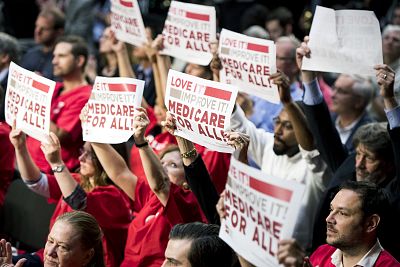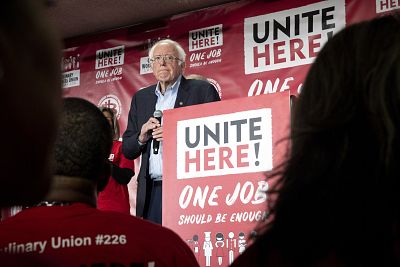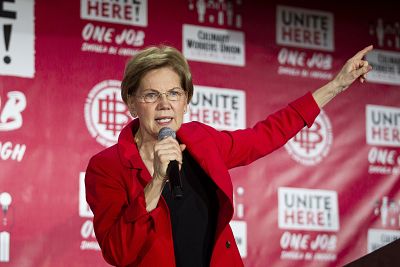Candidates have gone to great lengths to win over union support but members don't want to lose hard-earned health care benefits.
LAS VEGAS — In their quest for the Democratic nomination, presidential candidates have made major efforts to court support from organized labor — attending candidate forums, taking aim at major corporations and joining picket lines.
The candidates even nearly derailed last Thursday's Democratic debate in Los Angeles, standing in solidarity with striking food service workers of UNITE HERE Local 11, providing the pressure needed to help them win a contract with better wages and cheaper health care.
And they've gotten positive responses from labor in return. Recently, three leading 2020 Democratic candidates — former Vice President Joe Biden and Sens. Bernie Sanders, I-Vt., and Elizabeth Warren, D-Mass. — traveled to Las Vegas to tour union health and education centers and hold hour-long town hall meetings with standing-room only crowds at the headquarters of the influential Culinary Union.
But in interviews with NBC News, many national union leaders say there is one big issue possibly standing in the way of their members' full-throated support for some of those candidates: proposed "Medicare for All" plans that would eliminate private insurance.
The fight over "Medicare for All" has been a major flash point in the Democratic race, a dynamic that was on full display at those town hall gatherings. Among the biggest concerns is the potential elimination of private insurance.
"We love our culinary health care, we want to keep it," Las Vegas union member Elodia Muñoz told Sanders, explaining she was on strike for over 9 months in desert heat, in part to secure the insurance plan she uses.
"I don't want to change it, why I should change it?" asked Muñoz as scattered members of the audience began loudly chanting, "Union healthcare!"
Unions typically negotiate better health care for their members than what non-unionized workers receive. They will sometimes forgo pay increases in exchange for better benefits, including strong health care coverage, low cost medical plans, and pensions.
For example, United Auto Workers who held strikes against General Motors earlier this year were concerned primarily with their negotiated health care plans; low premiums, low co-payments to see doctors, and a plan that covers about 90 percent of all costs.
Candidates have sparred over the costs, choice, and feasibility of passage of "Medicare for All" plans proposed by candidates like Sanders and Warren in a gridlocked Washington. This has allowed candidates like Biden and South Bend, Ind. Mayor Pete Buttigieg to seize on union concerns in their opposition to such sweeping overhaul.
"You're going to get to keep it with me," Biden said to a member at his Wednesday town hall when asked about health care. Biden later referenced Sanders and Warren in saying the costs of "Medicare for All" are too high, saying his plan is "Medicare for those who want it," a phrase similar to what Buttigieg uses.
The town hall took place in front of members of the powerful Culinary Union Local 226, a union known as a kingmaker in Nevada politics, representing over 60,000 workers in the state.
Although leaders of both the Culinary Union and its umbrella organization UNITE HERE tell NBC News they hope to make an endorsement, they have not committed to officially supporting a Democratic candidate before the Nevada caucus.
The Culinary Union offers members a family health care plan that has no premiums, carries no deductible and covers approximately 98 percent of costs. Their website boasts that the union members "benefit from one of the best health insurance plans in the country -- and it's free."
Geoconda Argüello-Kline, the secretary-treasurer of the union, told NBC News that any "Medicare for All" plan that would put their plan at risk would be a tough sell.
"We have the Culinary Union healthcare and the members — if I go knock on the door to them and saying hey, you have to give up your healthcare, they never will let that happen," she said.
Last Tuesday, Sanders explained that coverage under his plan would be comprehensive and that union workers would benefit from higher wages under his health care plan.
"Your employer will not have to pay $15,000 a year for your healthcare, your employer will pay 3,000 — that's a 12,000 differential," Sanders said, using rough figures. "You know who gets that 12,000? You get that 12,000!" he continued to loud applause.
But Marc Perone, president of the United Food and Commercial Workers union, told NBC News that he was against mandated "Medicare for All."
"In some parts of the country, I think that the health care benefits that we provide are far and away better than Medicare for All," said Perone. "In other parts of the country, depending on the location, it might, it might shift the other way. So, what we want to be able to do is have the option."
And other union leaders said they were undecided on what a health care overhaul should look like.
"We are for universal coverage for everybody in this country," said Mary Kay Henry, president of the Service Employees International Union. "Our union has said, any policy fix to achieving that goal, we're for. The devil's in the details."
Sara Nelson, the international president of the Association of Flight Attendants and a vocal advocate for "Medicare for All," pushed back on the idea that unions were generally leery of such a system.
"What I have heard is that union members are very concerned about health care," said Nelson. "This is a key issue in this presidential campaign and at this point in our politics."
It's clear the concern is having an impact. Sanders' pro-union "Workplace Democracy" plan clarified that that employers would be forced to increase wages or expand other benefits in lieu of an employer-supplied health care plan.
And while Warren did talk about her health care plan and the need for universal insurance, she didn't use the phrase "Medicare for All" during her culinary union town hall. Her latest plan explicitly offers insurance that "for unions that seek specialized wraparound coverage and individuals with specialized needs, a private market could still exist."
At an Ankeny, Iowa town hall in late November, Warren was asked by a concerned voter about her father's union health care plan and it being replaced under her plan.
"So, if dad's still working and he's still got his good union job, he will get full healthcare coverage, only his paycheck will go up," Warren said. "And it means that the unions going forward — this is only for folks who have a collective bargaining agreement — the unions as they go forward can negotiate over wages, they can negotiate over keeping jobs here in America, they can negotiate over working conditions, but they don't have to negotiate over the healthcare part."
To some progressive unions, full-throated support of "Medicare for All" isn't a liability but a plus. Recently, Sanders obtained the backing of the National Nurses United union (NNU), a 150,000-person union which also supported Sanders' 2016 bid. The nurses union is a strong supporter of the idea.
Other unions remained unconvinced.
"I think Sanders' approach does not work," said Stuart Appelbaum, president of the Retail, Wholesale, and Department Store Union, and chair of the DNC's labor council. "We hear all the time how if we provide more money to employers that they have the money available to increase wages and benefits and it does not happen."
D Taylor, president of UNITE HERE, a labor union of over 300,000 members that work in a variety of industries, said it's a tough sell for many.
"It is very difficult if you tell somebody, 'I'm going to take something away from you that you like and it's good' for something they don't know about," added Taylor. "That's a pretty tough thing to do."














